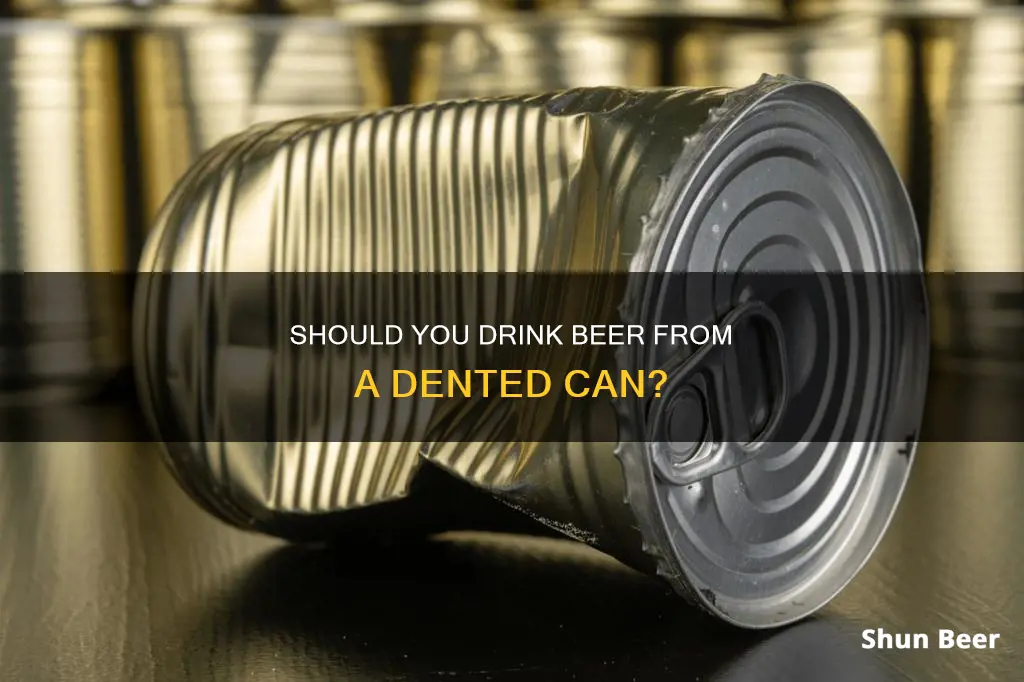
Whether or not you can safely drink beer from a dented can depends on several factors. Firstly, the size and location of the dent matter. If the dent is minor and located on the side of the can, it is unlikely to cause any issues. However, if the dent is significant or affects the rim or opening tab, it may be unsafe. This is because deep dents or those near openings can provide an entry point for bacteria, potentially leading to spoilage or contamination. Bulging cans should also be discarded, as they could indicate bacterial growth, yeast fermentation, or temperature changes. Additionally, always check the appearance, smell, and taste of the beer for any signs of spoilage. While the risk of botulism from drinking beer out of a dented can is low, it is still a possibility, especially with home-brewed beer.
What You'll Learn

It's likely safe to drink from a dented can if it's made from aluminium
It is likely safe to drink from a dented can if it is made from aluminium. Aluminium cans do not rust, so a small dent in the side of a beer can should not be cause for concern. However, it is important to note that if the airtight seal of the can has been damaged, it may no longer be safe to drink from.
You can test whether the airtight seal has been damaged by tapping your fingernail against the side of the can and listening to the noise produced, or gently squeezing the can. If it sounds hollow, that means air has gotten inside, and it is not safe to drink. If the can springs back into shape very quickly or is very easy to squeeze, that also indicates that the airtight seal has been compromised.
Dents in cans are only a concern if they have punctured the can or damaged the airtight seal, allowing air to get inside. This is because air can cause bacteria to develop inside the can, which could make you sick. However, a small dent on the side or top of the can is usually not a problem.
It is worth noting that some cans have a coating on the inside, which can crack or break off into the food or drink when the can is dented. However, this coating is designed to prevent the aluminium from coming into direct contact with the contents of the can, so even if a small amount ends up in your drink, it is unlikely to be harmful.
Overall, while it is generally safe to drink from a dented aluminium can, it is always a good idea to exercise caution and check the can for any signs of damage or compromise before consuming.
Beer and Colonoscopy: What's the Safe Timeline?
You may want to see also

Dented cans that are bulging or have sharp edges are unsafe
If a dented can has sharp edges, it is most likely not safe to consume its contents. The sharp edges may be an indication that the can is compromised and bacteria may be present. It is crucial to inspect the can for any signs of leakage, obvious damage, or cracks. If the dent has affected the opening tab pull, it is recommended to dispose of the can as microorganisms may have entered.
Furthermore, it is important to consider the location of the dent. If the rims or the opening pull tab area are dented, it is possible that microorganisms could have entered the can, and disposal is recommended. Washing cans before opening them is also suggested, as swab studies have shown that bacteria from dirt, rats, and bugs can be present on the surfaces of cans during storage.
In summary, when dealing with dented cans that are bulging or have sharp edges, it is crucial to prioritize safety and follow the guidelines provided by the USDA. Discarding or returning compromised cans is always the safest option to prevent potential health risks associated with consuming contaminated food or beverages.
Beer and Metoprolol: What You Need to Know
You may want to see also

Botulism is a risk from damaged cans, but it's rare
Botulism is a rare but serious illness caused by a toxin (poison) that attacks the body's nerves. It is caused by the bacterium Clostridium botulinum, which produces the botulinum toxin. This toxin is the most toxic substance known to humankind—millions of times more toxic than cyanide. The toxin binds to neurons, rendering the cell unable to release the neurotransmitters required to make muscles move. The end effect is flaccid paralysis—the inability of a patient to contract their muscles. Untreated, 50% of patients die due to paralysis of their respiratory muscles; they literally asphyxiate. Even with modern medical treatment, 5-10% of affected patients die, and those who survive often experience long-term (even permanent) disability.
Botulism is a risk from damaged cans, but it is rare. Dented cans may be compromised as air can get in, and any air that enters a damaged can may develop bacteria. However, the risk of botulism from a damaged can is low, and a more concerning feature would be bulging cans.
Botulism grows under a limited range of conditions: it needs a source of protein for growth, a pH above 5.0, a salt concentration below 5-10%, a sugar concentration below 30%, and an oxygen concentration below 2%. Botulism is also relatively tolerant of alcohol and is not fully suppressed until the alcohol content reaches 6% ABV. Exposure to botulism spores is common, but cases of botulism are very rare. In the US, there are around 15 cases of food-associated botulism per year, with the remaining cases in infants (who are very susceptible to the bacteria) or IV drug users.
Drinking Non-Alcoholic Beer: Safe to Drive?
You may want to see also

Beer cans are usually dented from being dropped or frozen
Generally, a beer can that has been dented from being dropped is still safe to drink. The dent usually occurs when the can is crushed upon impact, but the beer inside is typically unaffected. In most cases, the can's shape may be slightly deformed, but the contents remain safe for consumption. It's also worth noting that beer cans made of aluminium do not rust, so you don't have to worry about drinking rust if the can has been dented.
However, it's important to inspect the can carefully before consuming the beer. If the dent is minor and has occurred on the side of the can, it is usually safe to proceed. On the other hand, if the rim or opening pull tab area is dented, it is possible that microorganisms could have entered the can, and it is recommended to discard it. Additionally, if the can has any sharp edges or leaks, it is best to avoid consuming the beer as it may be contaminated.
Another factor to consider is the storage time of the dented can. While a recently dented can may be safe to drink from, it is important to check for spoilage if the can has been stored for an extended period. This can be done by pouring the beer into a glass and examining its appearance, smell, and taste for any signs of foul odour, cloudy appearance, or unusual taste.
In summary, a beer can that has been dented from being dropped or frozen is typically safe to drink, especially if the dent is minor and occurred on the side of the can. However, it is crucial to inspect the can carefully for any signs of more severe damage, such as dents near the opening or sharp edges, as these could indicate potential contamination. Additionally, checking for spoilage is recommended if the dented can has been stored for a while.
Beer and Eliquis: Safe Mix?
You may want to see also

If in doubt, discard the can
Dented cans can sometimes be safe to drink from, but it depends on several factors. Firstly, the location of the dent is important. If the rim or opening tab of the can is damaged, it's best to discard it. These areas are more vulnerable to bacteria entering the can and potentially contaminating the contents. Even if the dent is elsewhere on the can, it's important to inspect it for any signs of sharp edges or abnormal deposits, which could indicate a higher risk of bacterial contamination.
Another factor to consider is the severity of the dent. If the dent is minor, it's likely safe to consume the beverage. However, if the dent is deep enough that you can lay your finger in it, it's best to discard the can. Deep dents can create openings for air and moisture to enter, providing an ideal environment for bacteria to grow, which could lead to foodborne illnesses such as botulism.
It's also important to be vigilant for any signs of spoilage, especially if the dented can has been stored for a long time. Before opening a dented can, check for any leaks, cracks, or bulging, which could indicate that the contents have been contaminated or spoiled. If the can looks normal, you can try pouring the beer into a glass and examining its appearance, smell, and taste for any signs of spoilage. If the beer looks cloudy, smells foul, or tastes unusual, it's best to discard it.
While the chances of getting botulism from a dented can of beer are relatively low, it's still a risk to consider. Botulism is a serious foodborne illness that can attack the nervous system, causing difficulty in swallowing or breathing, muscle weakness, vomiting, nausea, and even death. The good news is that botulism can be destroyed with heat, so if you're unsure about the safety of a dented can, you can try heating its contents to a temperature of 176°F (80°C) for 30 minutes or 212°F (100°C) for 10 minutes to reduce the risk of illness.
In conclusion, when it comes to dented cans of beer, it's always best to err on the side of caution. If you have any doubts about the safety of the can or its contents, simply discard it and get yourself a fresh one. Your health and well-being are worth more than the cost of a new can of beer.
Non-Alcoholic Beer and Minors: Is It Safe?
You may want to see also
Frequently asked questions
Beer from a dented can is usually safe to drink, especially if the dent is minor and the can is not bulging. However, if the dent is severe or the can is bulging, it is best to discard it.
Check for any signs of spoilage, such as a foul smell, cloudy appearance, or unusual taste. If the dent has affected the opening tab pull, it is best to discard the can.
If the dent is minor and the can is not bulging, the beer is likely safe to drink. However, if the dent is severe or the can is bulging, it is best to discard it.
Botulism is rare in commercially brewed beer due to the strict conditions under which it is produced. While it is possible for botulism to grow in home-brewed beer, it is still unlikely.







